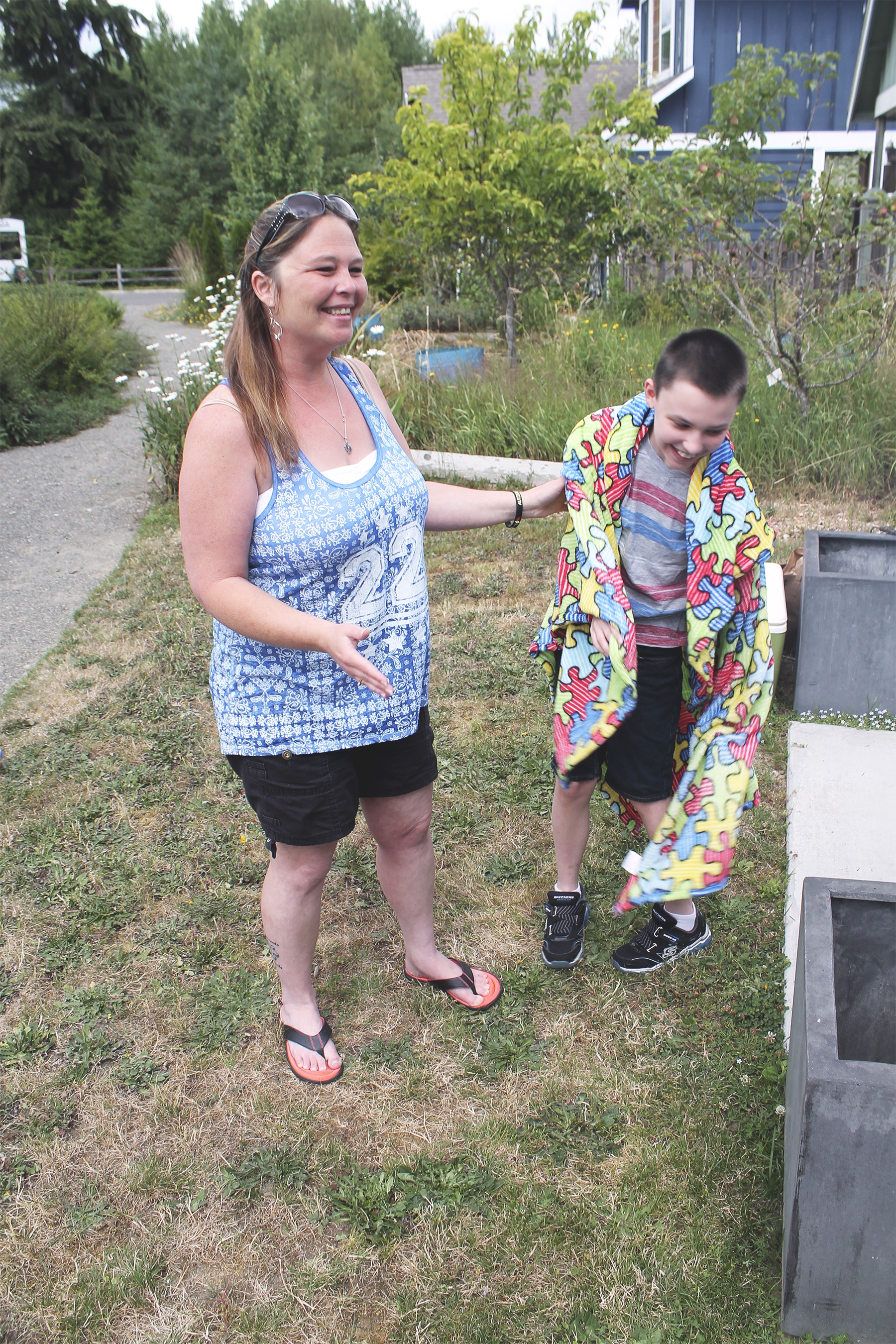For most 11-year-old children, talking with other children and their families and learning new words are everyday occurrences, but for Kaleb Ansley, speaking is something he has never been able to do. Now, 2,300 miles from his home in Texas, and with help and donations from countless islanders, businesses and a local speech therapist, he is learning how to communicate.
Kaleb has autism and has been nonverbal his entire life. In order to express his wants, needs, likes and dislikes, he usually resorts to what islander and speech therapist Paula Herrington calls self-harming or “maladaptive means of communication,” such as hitting others or himself. He and his family are now in the midst of a six-week program with Herrington to utilize an iPad application that allows him to communicate.
“Our goal is to give him an appropriate means to communicate,” Herrington, who began working with Kaleb recently, said. “Instead of biting or hitting, he can say what he needs.”
Kaleb and the Ansley family’s journey to Vashon to secure Herrington’s services began last April when islander Raven Pyle-McCrackyn met the Ansleys on an Autism on the Seas cruise. Seven families with autistic children were on the boat, and Pyle-McCrackyn said they all “got to know each other really well.” That’s where she met Kaleb and discovered he could communicate even though he didn’t speak.
“Kaleb wasn’t talking, but I was asking questions and putting my fingers out, giving him two choices. ‘Kaleb,’ I said, ‘Are you trying to tell me you want another Coke’ — I pushed out my left hand — ‘Or are you just walking around’ — I pushed out my right hand. He looked right at me and grabbed my left hand,” she said. “Although no one had ever done this with him, he immediately grasped at this new way to communicate.”
Pyle-McCrackyn said that during that cruise, which the Ansley’s were atteding on a scholarship, Kaleb’s parents expressed frustration that they were not able to get the help their son needed near their hometown in southeast Texas. Articles in the news magazine Governing and the Texas Tribune newspaper report that many parents fighting for treatment for their autistic children, are “butting heads with Texas officials,” after decisions that the state will not cover behavioral or other “home-based” therapy services under Medicaid.
“We recently found out that they’re cutting back on Medicaid,” Kaleb’s mother, Kim Ansley said last week. “He has been released from speech classes and therapy, with therapists saying there’s nothing else they can do.”
From the moment Kaleb grabbed Pyle-McCrackyn’s finger, she never forgot him and said that “if she ever won the lottery,” she would figure out how to bring him out to work with Herrington.
“I talked to Paula, who is nearly at the top of her field … and she said, ‘You don’t have to win the lottery, just bring them out here,'” Pyle-McCrackyn said.
That was one month ago. She immediately began an ambitious effort to fundraise money to cover the $10,000, six-week therapy, secure a temporary home and provide enough food for the family of four during their stay on Vashon. Herrington also discounted her services, offering a rate that was 75 percent cheaper than normal.
On Friday, Pyle-McCrackyn said that islanders had donated airline miles to fly the family out, $6,000 to help pay for therapy, given a home for the family to stay in and multiple island businesses such as Thriftway and Zombiez donated gift cards.
“She gave us the chance of a lifetime to do intensive therapy,” Kaleb’s mom, Kim Ansley said of Pyle-McCrackyn. “It’s very much a lot of, ‘Wow, is this true?’ From the airport, to getting the plane tickets, to staying here on the island, it’s been great.”
Pyle-McCrackyn’s coworker, Linda Van Stone, said that she was touched when she heard Kaleb’s story and believes the situation is a perfect example of the saying, “it takes a village to raise a child.”
“Vashon is a village,” Van Stone said. “It’s just amazing. I think it’s wonderful and the potential is amazing.”
That potential is being realized, Herrington said. For four days during the last two weeks, Kaleb has met with Herrington at her CLASS, Inc. office in Tacoma and learned how to use the app. On Fridays, he and his family have been taking to the streets with a therapist to interact with others and use the app in real life. With two weeks to go, the six weeks total of training will teach Kaleb and his family enough to allow them to head home and continue using the technology, Herrington said.
“We’re building language, hopefully he can go back to school and show his teachers that he can be taught academics. That’s critical.” Herrington said. “A lot of times, nonverbal children get stuck in a track that they can’t talk, so therefore they can’t learn. That is not true.”
The Ansley family will head back to Texas after Strawberry Festival.
“It’s heartwarming and rewarding to see a child legitimized,” Herrington said.
As for Ansley, she said she has seen Kaleb ask for something for the first time and communicate with his little brother.
“He’s doing amazing,” Ansley said. “The app is his voice.”



